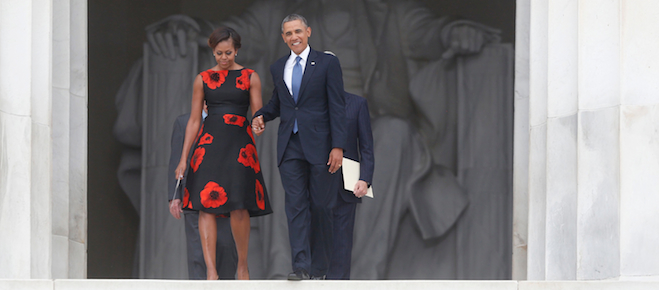Barack Obama: reduced to a symbol
The president’s soaring rhetoric didn’t matter yesterday
President Barack Obama and first lady Michelle Obama arrive at the 50th Anniversary of the March on Washington where Martin Luther King, Jr. spoke, Wednesday, Aug. 28, 2013, at the Lincoln Memorial in Washington. (AP Photo/Charles Dharapak)
Share

Barack Obama speaking to anybody, anywhere, used to be a spectacle. Now, almost five years after Americans elected him their president, and nearly nine years after his emergence as a certified orator at a Democratic National Convention, Obama commands nowhere near the same captive, entranced audience—nor does his soaring rhetoric blow the doors off the place like the good ol’ days.
The president stood beneath the Lincoln Memorial yesterday, fifty years after Martin Luther King Jr. told the world about his dream of racial equality. Obama spoke to tens of thousands assembled around the famous reflecting pool. Yesterday, Obama himself represented how far King’s dream has come. Father Raymond J. de Souza, writing in the National Post after the speech, wrote that Obama’s declining power to mesmerize people simply by opening his mouth mattered not at all yesterday, when “his presence was enough.”
Indeed, the president stood as a symbol. He spoke slowly, comfortable with the people around him on stage—First Lady Michelle Obama, former Democratic presidents Carter and Clinton, King’s family, Oprah Winfrey—and the crowd in front of him, and referenced his own electoral triumphs as proof that progress is possible.
Obama’s long been a symbol, formerly of that nebulous hope that vaulted him to power. But de Souza’s contention, which he probably meant as a compliment, casts doubt on Obama’s influence, read differently. In the glorious days when hope reigned, way back in 2008, Obama was the future. Now, as he trudges through his final term, the content of his speech yesterday—even on an anniversary so fundamentally important to the fight for civil rights, and to his own life’s work—was mostly unimportant. He was a symbol of what Americans accomplished five years ago, not what they can accomplish five years or 50 years from now.
Times change, stars fade. But stars rise, too. Who knows who will stand in the same spot five decades hence?
What’s above the fold this morning?
The Globe and Mail leads with Canadians’ increasing debt. The National Post fronts the 50th anniversary of Martin Luther King’s “I have a dream” speech. The Toronto Star goes above the fold with a former judge quitting the review of Toronto police conduct. The Ottawa Citizen leads with potential legal challenges to the city’s decision to restrict a casino to a raceway in the south end. iPolitics fronts the government’s continued lack of regulations on oil and gas emissions. CBC.ca leads with the UN’s envoy to Syria claiming a chemical “substance” was used during last week’s alleged attack on civilians. CTV News leads with the possible release of two Canadians detained in Egypt. National Newswatch showcases a Vancouver Sun story about Liberal Leader Justin Trudeau’s apparent courtship of Vancouver Mayor Gregor Robertson for a federal run.
Stories that will be (mostly) missed
| 1. Bombardier. The Canadian manufacturer’s plan to build $3.4-billion worth of Q400 airplanes in Russia—not in its Toronto facility—has an employees’ union upset about exporting jobs. | 2. Porn. Former public safety minister Vic Toews said he’d put an end to pornographic movie screenings in Canadian prisons, but a briefing note prepared for him said that’s “impossible.” |
| 3. Taxes. A polygamous sect in Bountiful, B.C., had their appeal to receive special tax treatment denied by a judge, who concluded that leader Winston Blackmore grossly understated his income. | 4. Transit. Vancouver’s public transit authority says ads depicting shrinking Palestinian lands in the face of Israeli occupation will not be removed from buses, even if they offend some riders. |
| 5. Congo. UN and Congolese forces, acting on a more aggressive mandate, attacked rebels near the eastern capital of Goma, an assault that killed a UN peacekeeper and injured seven others. | 6. Bubonic plague. A 15-year-old boy who was camping in mountains in Kyrgyzstan, and who ate barbecued marmot, died of the bubonic plague—a treatable disease, if caught early. |